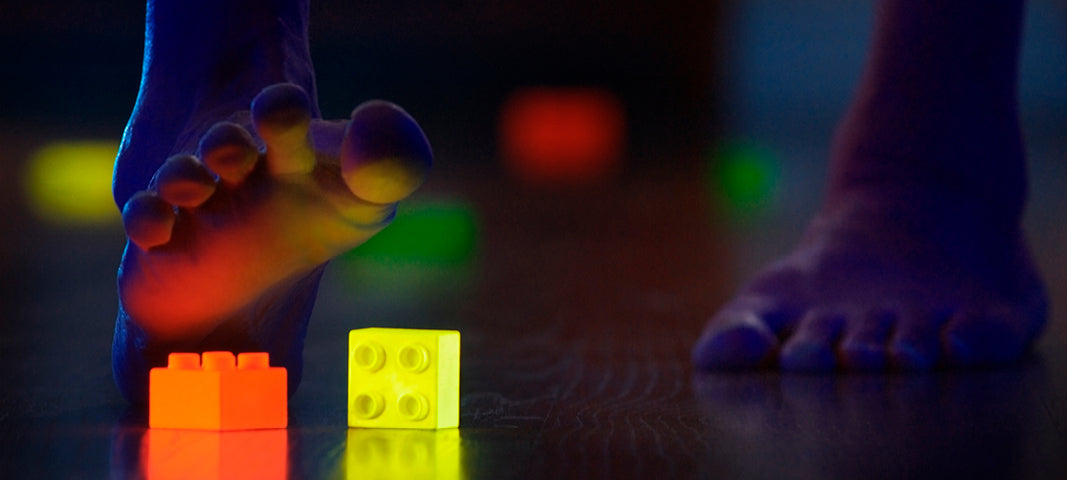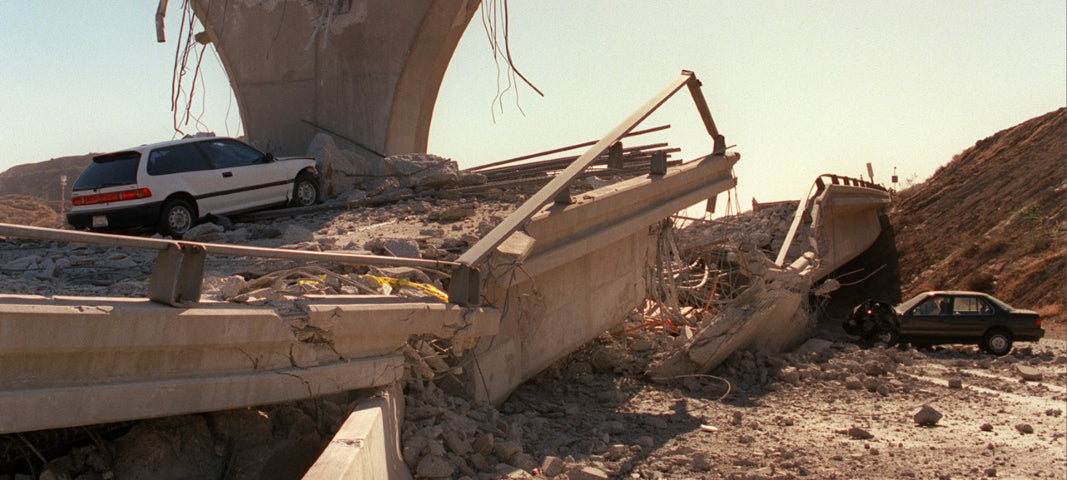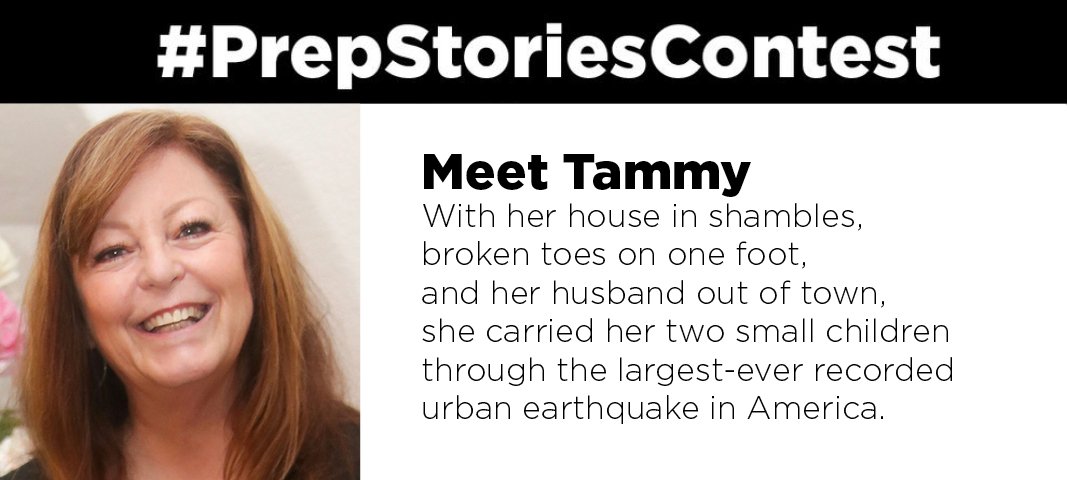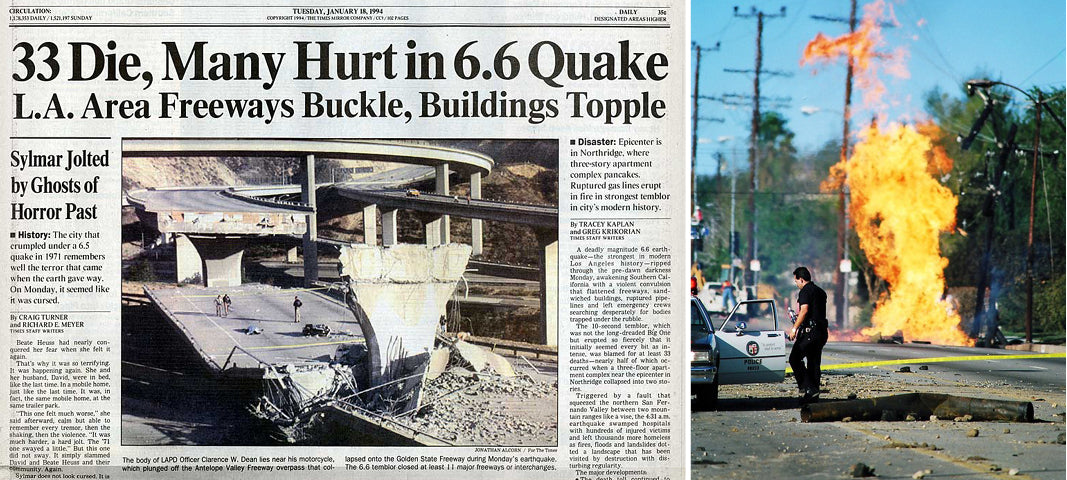Hear how Tammy carried herself and her two small children through the historic Northridge Earthquake of ’94.
The most dangerous thing about earthquakes might just be that you don’t expect them—that you can be in the middle of a perfectly ordinary day at the office, walking the dog, or fast asleep, and without notice the world literally begins falling apart around you.
That’s where Tammy found herself some 25 years ago. Back on January 17th, 1994, she and her two small children were asleep in her home in Los Angeles (where she lived at the time—she now lives in Idaho). Her husband was out of state on a business trip. It was an average day by most measures, but just about the worse situation she could find herself in to ride out the largest recorded urban earthquake in North American history.
At 4:30 am there was a terrible rumbling centered around Reseda, California. It was a 6.7 earthquake that lasted just 10 to 20 seconds but damaged property up to 85 miles away, injured around 8,700 people, and tragically took between 33 and 60 lives.
With her house in shambles, broken toes on one foot, and her husband out of town, Tammy carried herself and her two small children through it all. She’s our Preparedness Stories Contest winner this month, and she has lessons to share that EVERYONE needs to hear. She’ll talk about what it’s like to live through a massive, destructive earthquake; the lessons she learned about how to prepare; and the impacts of trauma on children during (and after) a natural disaster.
ALONE WITH TWO CHILDREN WHEN THE SHAKING STARTS
EE: Let’s talk about the day of the earthquake. You said your husband was out of town that day and that you were alone with your small children, is that correct?
Tammy: That’s exactly correct. Yes. He was on location in Arizona. Myself and my two children were asleep, and all of the sudden, this shaking was unbelievable and I ran through to get them. I grabbed my son who was four at the time and unfortunately I stepped in his box of Legos and broke a few toes. After that I went to my daughter’s room and the place was still shaking and grabbed [her]. And since I couldn’t see—it was dark—I grabbed her by the hair—she had long blonde hair—and dragged her down the hallway. The three of us crawled underneath an oak table that we had.
EE: Wow. So the shaking stops, and then what happens?
Tammy: Knowing me I probably stayed there at least five to ten minutes. It was noisy, you heard things breaking, mostly the sounds because my house was cracking and in the backyard the fence came down—a portion of it—and just being scared to death. It was no fun at all.
EE: At that point do you leave the house?
Tammy: I do remember getting out from under the table and running out the front door. And I felt like I was the only one in the neighborhood who had. It was pitch black out and I was standing out there. [My next door neighbor] eventually came out and we talked excitedly.

MY SON WAS BEYOND REACH
EE: You said that your son was kind of exhibiting some panic. Can you tell me what it was like a little bit having children in a situation like this, being alone?
Tammy: [We went outside and] they were attached to me and they just stood there in awe. They were just kind of like, “what just happened?” I don’t even think they said anything they were sacred—scared to death just as I was.
I was really worried about my son because as the day went on, he became more introverted. He wouldn’t go int he house—now mind you he was four or five years old at that point. He went into my car and sat here and wouldn’t come out. He wouldn’t eat anything initially until I got the cereal and milk out.
But my daughter who was eight at the time, she just followed me around. I don't even remember any other upset from her. She just followed me around because she knew that Mama would take care of things. That's what both kids did, but my son was truly traumatized.
EE: Were you able to go anywhere for a few days?
Tammy: I was hysterical trying to get a hold of my husband. And back then we didn’t have cell phones. And my husband had heard about it, he was at work and he got all upset. But he couldn’t reach me anymore than I could reach him because we had no phone service, no electricity, no gas—we had no utilities whatsoever.
So I stopped at a phone booth that had probably 25 people in line. [I] parked the car and my son would not get out but my daughter did and stood with me until we could get to the phone.
I really didn't know the phone number where my husband was because he was out on location, so I called my in laws and told them what was going on. They lived in Utah and they got a hold of my husband and in two days he was there when they opened the airport.
HELP FROM AN ANGEL
EE: So it was two days that you were without your husband, without any utilities, I mean, not even able to get a hold of him! Were you able to do anything to kind of help ease your [son’s] anxieties? Or was he kind of beyond reach for a little while.
Tammy: For a while he was beyond reach. He was traumatized. Truly was the word traumatized fits exactly what he was going through.
I actually ran out and got his bed and drug it through the house and put it in the car port so that he could come and lay on it and feel good, because we weren't back in that house unless we absolutely had to.
And there was this wonderful man, I will never forget this. He as walking up and down the street and he had a cap on. He was with the Angel's Watch, it was called back then. And he was walking our neighborhood to make sure the neighbors were OK. He was in his early twenties. He was kind enough to stay with my son in the car and talked him out of the car, to at least get into his bed. [That young man] actually kind of broke that traumatizing feeling [my son] was in.
[My son] really didn't go back to normal right away by any means. But that gentleman helped us and he was truly an angel for me that day.
EE: It's amazing how sometimes the influences and voices of people who aren't mom and dad can make a big difference in getting through to [kids], even at that young age.
Tammy: Yes, he was terrific, he was absolutely terrific. and he went around to everyone's homes.
KEEPING OUR MINDS OFF THE QUAKE: DINOS, RHINOS, AND A PET CAT

EE: Did you have trouble keeping [you children] occupied, was that ever an issue? You know, keeping them from climbing the walls.
Tammy: They never did climb the walls. The kids were passive about it.
We took a walk around the neighborhood. The lady behind us had a cat that we gave her [so] we went and visited the cat. But it was just around the block. She had dinosaurs in her front yard that were plants—like these little Japanese plants that grow and you can shape into animals.She had a giraffe and a Rhino out there and brontosaurus. She had different things. So we went over there and we enjoyed it together, the three of us. It was really something—it's whatever you can find.
We tried to play games, but nobody’s mind was really on it. Because we did have aftershocks. And so it was kind of like of my gosh there's another one and it takes you right back to the morning that it started. And you panic instantly again because you don't know if you're house is going to fall down—if the house is going to fall on you no matter where you are. If the streetlight is going to fall over. It was icky.
Actually, before daylight on the seventeenth, there was an explosion one street over from us. And it turned out it was a gas main. And we heard the ambulances. Of course, we heard those all over the place.
They were trying to put the fire out and it was a little hard for them to do because it was natural gas and they had to have the gas company come out. It was a real safety issue. And I don't even know when it turned off. I just remember feeling the heat from it a full bock away.
STORE WHAT YOU EAT, EAT WHAT YOU STORE

EE: You said that all of your food kind of burst out of your refrigerator. And without power anyhow, I'm sure whatever was in there when badly very quickly.
Tammy: The refrigerator…I didn't even think about the refrigerator, which is so odd, because they always open in a massive earthquake. And the food just flew out—the milk containers and ketchup bottles. It was an icky mess.
And I had the heating the heating element, oatmeal, cereal, and dried milk. Granted, I mixed it with what little [fresh] milk was left in the container that I had. And it worked out really well. And I ended up making macaroni and cheese. I think that's all we ate all two days was macaroni and cheese and oatmeal.
EE: This wasn't just boxed Kraft mac and cheese?
Tammy: No, it was emergency storage. I actually had macaroni underneath my bed in long containers. And I had that and I had the dried milk and I had water and freeze-dried cheese. But it all came from Emergency Essentials. So I was really lucky that the things that my children would eat were in my house and I [didn’t have to] think twice about it.
EE: That's one of the things that I've thought about as I prepare my emergency supply. I look at some of the buckets of food we have and they’re great but it’s like, my kids wouldn’t touch this. We can barely get them to eat during peaceful times, what will my kids eat in emergency?
Tammy: Well, store what you eat, eat what you store. It couldn't be more true.
EE: That's great advice.
Tammy: You have to make accommodations for those in your family. If you have small children, maybe you can have bottles of baby food and then rotate them. But if you don't have them and you have a massive earthquake, that's a very big thing. If you don't have the food that you're [actually] going to eat and that your children are going to eat, you risk their health, your health, and the mental stability that food actually does give you.
COPING IN THE AFTERMATH

EE: So when did you husband arrive?
Tammy: I never did talk to him. He just showed up. Because there was no way for me to reach him. The airports were closed and he had to wait to get here. I didn’t have a vehicle. But he waited till the airports were open and he flew to Burbank.
EE: But he did have word from your family in Utah that you guys were OK, because I can't imagine what that would be like for him.
Tammy: It's really important to have an out-of-state contact, and I didn't realize how important it was until that day. It's important because you want to tell your friends and family you're ok if you can even get out. Or if you need this or that but I don't have it, can any of you please get it to me?
EE: In the weeks and months afterward, how did your family recover? I just am so struck by the image of your son being traumatized. Was there ongoing trauma?
Tammy: Yes. [We flew to Arizona with my husband]. Once we got [there] we felt comfortable. My son was coming around a little bit. He was doing much better once we were away.
And then we went to Texas, this is seven-and-half, eight months later. A tornado was happening and we'd never been involved in a Tornado. And it was throwing things around in the apartment building we were living in. [There were] chairs being slammed around.
I flew out of bed thinking we were having another earthquake. I grabbed my son, grabbed my daughter, and went to the doorway and the three of us started crying.
And my husband's looking at us like, “what's wrong with you guys?”
“We're having an earthquake!”
“No we're not.”
And I had to learn as my children did that sounds are OK. But it carried with us for quite some time, and it's with me still to this day.
WHAT I WOULD HAVE DONE DIFFERENTLY—LESSONS LEARNED
EE: But looking back is there anything you would have done differently.
Tammy: Absolutely. [It has] been a rule ever since that happened: Keep a path open to your childrens’ rooms. You are not allowed to leave toys on the ground, so if we have to run in the dark and rescue our children we aren't going to break our leg. It's really important.
Also, do emergency drills, I had done this with my children. Pretend at night, turn off all the lights and run downstairs. First walk, but teach your children the layout of the house with their eyes closed. How many stairs do you have to go down? I have two sets of stairs in my house and one is six steps and the other is ten. To me, knowing that, I feel better if I have to run down the stairs because I know when it starts and stops.
It helps your children, They won't be so afraid if they feel prepared, because being prepared is being powerful. And if you don't take control of the immediate situation, having all your ducks in a row, it's really hard. I listened to stories from my friends who told me how difficult it was and how they couldn't get water and how my girlfriend had a new baby. She was having trouble.
Also, think about alternative places to put things in your house. Don't put it all in one spot.
EE: I think that's great advice not just for people in earthquake country.
I mean, tornadoes, right, you're going to potentially lose a portion of the house. Having things throughout the house in case my garage goes down or the [kitchen] roof collapses and we can't access things [there], at least there are other items throughout the house.
Tammy: I have medical supplies in three different places in my house so there will be easy access. And I check the dates on it—that's another thing that's important to do on rotating anything and everything that you store.
And secure your furniture. I had a huge fancy armoire in the bedroom I just moved out of because we built another master bedroom. Had I been in that first room during the earthquake that enormous armoire would have probably killed me. It fell onto the middle of the room and broke. And it probably weighed two hundred pounds. I remember seeing that just going, thank you God. Because that wasn't a smart thing to do.
If you can't afford large quantities of food, or a months' supply, truly designate an amount of budget so that you can order a number 10 can of dried cheese or beef stew or something like that. But have it at the ready.
And don't forget that you don't have a choice in what happens in a natural disaster. What you do have is knowledge and power to be able to survive it.
EE: Thank you so much Tammy!




2 comments
Arlene butler
Thankyou so very much for the important information you have given many of us who have never experienced such a horrible disaster . Having food in many different places knowing how many steps there are in each staircase. Not having clutter. I will be taking a very good look around my home to try and prevent possible trouble spots. Thankyou .
Judith Pickett
So very helpful to hear a description of things that actually happen in an emergency or disaster, especially the idea of having supplies in different places & NOT all in one place like 1 room or the basement. The idea of keeping things cleared away so as NOT to stumble over them in the dark when trying to gather family members – great thought to pass along.